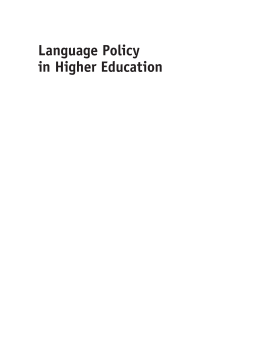
Additional Information
Book Details
Abstract
In today's increasingly interconnected, knowledge-based world, language policy in higher education is rapidly becoming a crucial area for all societies aiming to play a part in the global economy. The challenge is double faceted: how can universities retain their crucial role of creating the intellectual elites who are indispensable for the running of national affairs and, at the same time, prepare their best-educated citizens for competition in a global market? To what extent is English really pushing other languages out of the academic environment? Drawing on the experience of several medium-sized language communities, this volume provides the reader with some important insights into how language policies can be successfully implemented. The different sociolinguistic contexts under scrutiny offer an invaluable comparative standpoint to understand what position can – or could – be occupied by each language at the level of higher education.
This book seeks to fill a gap in the study of higher education language policies. It is a well-researched, well-documented, and thoughtful comparative consideration of the challenge of internationalisation for ‘linguae academicae’ other than English. Vila and Bretxa’s edited volume will definitively help decision-makers, language activists and scholars to understand the complexities and to identify the opportunities for universities under the current process of internationalisation, and to reduce the anxieties it sometimes produces.
Xabier Arzoz, University of the Basque Country, Spain
This book focuses on languages under pressure from globalization to lose their prestige status at universities. While major languages remain strong, medium-sized ones are close to succumbing to the global champion, English. This volume lucidly combines theory with meticulous case studies to reveal insights opening up new research perspectives and applications.
Ulrich Ammon, University of Duisburg-Essen, Germany
F. Xavier Vila is an associate professor in the Department of Catalan Philology and Director of the University Centre for Sociolinguistics and Communication at the Universitat de Barcelona. He has published widely in the areas of sociolinguistics, demolinguistics and language policy, including Survival and Development of Language Communities: Prospects and Challenges (Multilingual Matters, 2013).
Vanessa Bretxa is a researcher in the sociology of language at the University Centre for Sociolinguistics and Communication at the Universitat de Barcelona and a part-time lecturer in the Department of Linguistics at the same university. She is also the co-editor of the academic journal Language, Society and Communication.
Table of Contents
| Section Title | Page | Action | Price |
|---|---|---|---|
| Contents | v | ||
| Tables and Figures | vii | ||
| Contributors | xi | ||
| 1 Language Policy in Higher Education in Medium-Sized Language Communities: An Introduction | 1 | ||
| 2 The Position of Danish, English and Other Languages at Danish Universities in the Context of Danish Society | 15 | ||
| 3 The Position of Czech and Other Languages at Universities in the Czech Republic: Some Initial Observations | 43 | ||
| 4 The Position of Finnish and Swedish as well as Other Languages at Universities in Finland | 64 | ||
| 5 Challenges for Hebrew in Higher Education and Research Environments | 103 | ||
| 6 Challenges for South Africa’s Medium-Sized Indigenous Languages in Higher Education and Research Environments | 132 | ||
| 7 The Position of Catalan in Higher Education in Catalonia | 153 | ||
| 8 Medium-Sized Languages as Viable Linguae Academicae | 181 | ||
| Index | 211 |
